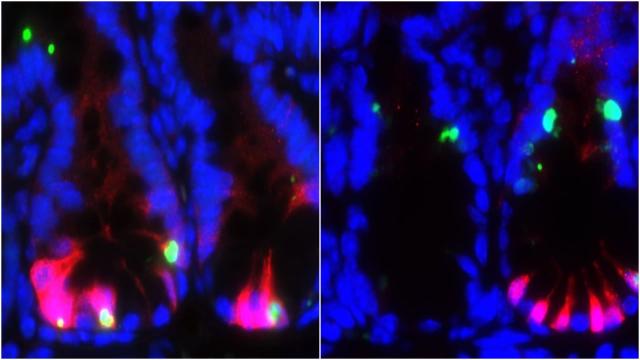One of the worst side-effects of chemotherapy treatment is the inadvertent damage it causes to the gastrointestinal (GI) system, leading to nausea, vomiting and diarrhoea. While there are short-term treatments available to help deal with these symptoms, oftentimes the damage can lead to chronic GI problems. Now, researchers at the University of Pittsburgh say they have found a way to short circuit the molecular pathway that sparks this gut damage in the first place.
The image on the left shows mice stem cells (red) being killed (green) by chemotherapy. The image on the right shows some stem cells protected by the PUMA inhibitor even with chemotherapy treatment. Image: Science Translational Medicine/Jian Yu.
Most forms of chemotherapy, including radiation, are like grenades: They’re great at killing cancer cells, but they will take out plenty of perfectly healthy ones nearby, too. That’s a problem for the cells that line and protect our gut from stomach acid and an overabundance of bacteria, since they need to be constantly replaced. Chemotherapy is especially destructive to the back-up supply of stem cells in the gut, which makes renewing the lining all the harder. That then leads to the myriad of GI problems it causes (hair follicles are also easily destroyed by cancer treatments, which accounts for the frequent baldness of cancer patients).
Research has shown that completely blocking the activation of a protein known as p53 could possibly protect healthy cells from this effect. But p53 is too crucial to the overall health of cells for that to be a realistic approach; blocking it entirely would only cause more problems than it’d solve. Instead, the researchers of this current study, based on their earlier studies, theorised that blocking another protein that sometimes activates p53, known as PUMA, could accomplish the same trick without being as harmful.
The researchers first created mice that were genetically unable to produce PUMA and dosed them with a common chemotherapy drug used to treat colon cancer. Some of the mice were also made to develop tumours. The healthy gut cells of mice unable to produce PUMA avoided much but not all of the splash damage caused by the drug, while it was still able to work its mojo on the tumours. They then tested out a small molecule thought to inhibit PUMA on a second group. Just like before, mice without PUMA had healthier guts, and the lack of PUMA didn’t seem to interfere with the drug’s antitumor effects. Lastly, they tested out the inhibitor on miniaturised, lab-grown mice and human colons, finding similar results.
The findings were published today in Science Translational Medicine.
“The PUMA inhibitor selectively protects intestinal stem cells from being killed by chemo and helps improve their ability to repair DNA, ultimately improving GI regeneration and long-term functions,” study authors Jian Yu and Brian Leibowitz, both at the University of Pittsburgh Medical Center’s Hillman Cancer Center and Department of Pathology, told me via email.
Encouraging as the results are, though, they’re just a proof of concept for now. And there are still a lot of improvements the UPMC team needs to make, such as refining the molecule to provide a sturdier buffer against chemotherapy damage.
“The lab has also been interested in identifying additional compounds that might act in concert with the PUMA inhibitor to provide even better GI protection against cancer treatments such as chemotherapy and radiation,” they said.
With any luck, they hope to reach trials involving larger animals – and eventually people – within the next three to five years.
